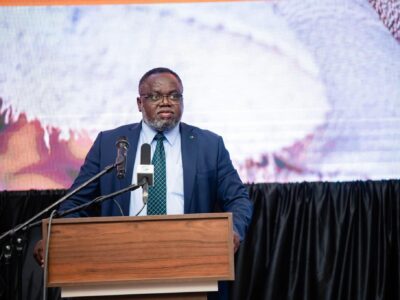The African Export-Import Bank (Afreximbank) says there is need to put into action what was agreed on to develop Zambia and Democratic Republic of Congo (DRC) battery mineral value chain, Zambia Monitor reports from Niamey, Niger.
Afreximbank Senior Manager, Gainmore Zanamwe, said at the side event to the ninth session of the African Regional Forum on Sustainable Development in Niamey on Sunday that Africa was well known for talking.
Zanamwe indicated that there was need to expedite what they were doing and start implementing what was agreed on in DRC in 2021.
“Africa is well known for talking, I think we need to expedite whatever we are doing and then start implementing what we agreed in DRC in 2021 and let’s focus on establishing precursor plant and move to the battery plant and move to electric vehicles,” he said.
In 2021, Zambia and DRC signed a cooperation agreement to develop their cobalt reserves, a metal that is essential to the energy transition and electric mobility because of its high energy storage capacity.
The Economic Commission for Africa, Afreximbank and a consortium of partners are working directly with DRC and Zambia to develop a battery mineral value chain within the two countries.
Zanamwe, however, acknowledged that some positive steps have been taken since the launch of this initiative but said time is of essence.
“We need to accelerate the pace, we need to equally move on to sign the framework agreement for the feasibility study and develop precursor plant and move to the battery plant.
“With all these statistics, electric vehicle value chain had tremendous opportunities… we are moving from US$11 billion to about US$48 to US$ 50 trillion in 2050 so we need to make sure we do what is required to get the right partners, investors to enable us actualise on this opportunity,” he said.
Zanamwe indicated that they were working with the African Continental Free Trade Area (AfCFTA) Secretariat to drive the automotive value chain.
He said they have just concluded a study on automotive regional value chain and now working on the continental regional value chain study.
Zanamwe added that the study had taken into account the issue of the battery and electric vehicle value chain.
He also pointed out that for the battery mineral value chain to be actualised, there was need to develop policies that support the development of such industries.
Zanamwe said the AfCFTA Council of Ministers have adopted the Continental Automotive Strategy, which would enable African countries work together to develop the automotive sector.
Acting Executive Secretary of the Economic Commission for Africa (ECA) Antonio Pedro said to meet the goals of the Paris Climate Agreement, the SDGs and Africa’s Agenda 2063, the world must decarbonize its growth models and shift to renewable energy sources.
Speaking during a panel discussion on ‘Building a regional battery mineral value chain in Africa, Pedro said the shift to renewable energy sources was a resource-intensive path that required greater production of a variety of minerals that are central to decarbonization.
Africa is home to many of such minerals. The Democratic Republic of Congo (DRC), for example, produces over 70 percent of the world’s cobalt.

He said DRC and Zambia together supply 10 percent of global copper while Mozambique and South Africa hold significant reserves of graphite, platinum metals, lithium and more.
“We have clear opportunities not only from the global green mineral boom but also from our domestic achievements, such as the African Continental Free-Trade Area to facilitate the development of regional value chains for these green economy products,” Pedro said.
He noted several innovative financing mechanisms that have been developed to support initiatives such as the battery and electric vehicles value chains.
“In the last two decades we have seen that without the right enabling policies and incentives, commodity super-cycles come and go, leaving our countries dependent on resource extraction,” said.
Pedro said the fact that about 70 percent of the region’s exports are unprocessed commodities, a situation that can change with the right policies that prioritise industrialization and value-addition in mining and other resource sectors.
University of Lubumbashi Jean-Marie Kanda highlighted that African countries need to own such projects and commit investment and appropriate funding for research on the battery technology.
“Africa needs to develop standards as far as batteries are concerned. We need to focus on the assembly of these batteries and focus on mineral exploitation as well as on recycling.” Kanda said.
ECA Senior Economist Jean Luc Matsaki Namegabe said DRC presented an opportunity in the development of electric batteries and vehicles not to be missed because it would move Africa up the value addition ladder as Africa was the only region that did not manufacture electric batteries.
According to a BloombergNEF study, the DRC is a favourable location for producing sustainable battery materials for high-nickel batteries due to its abundant cobalt resources and access to hydroelectric power.
The report estimates the global market opportunity for electric vehicles at $7 trillion by 2030 and $46 trillion by 2050
The study, which was supported by the ECA, Afreximbank, the African Development Bank, the Africa Finance Corporation, the Arab Bank for Economic Development in Africa (BADEA), the African Legal Support Facility (ALSF), and the UN Global Compact, suggests that battery precursors produced in the DRC would be cheaper, environmentally sustainable and more competitive than material produced in China, the US and elsewhere.
WARNING! All rights reserved. This material, and other digital content on this website, may not be reproduced, published, broadcast, rewritten or redistributed in whole or in part without prior express permission from ZAMBIA MONITOR.












Comments